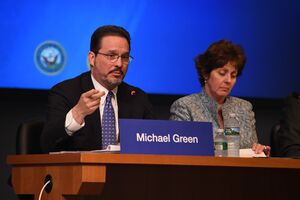Michael J. Green
(academic, spook) | |
|---|---|
 | |
| Nationality | US |
| Alma mater | Kenyon College, Johns Hopkins SAIS, Tokyo University, MIT |
| Member of | Aspen/Strategy Group, Australian American Leadership Dialogue, Center for a New American Security, Council on Foreign Relations/Members, University of Sydney/United States Studies Centre |
| Interests | • Asia • Japan • “national security” |
Not to be confused with Michael B. Green the deep politics researcher.
Michael J. Green worked in the National Security Council under George W. Bush with responsibility for East Asia and Australia, at a time when Japan, Australia and other allies in the region got pushed to militarize.
He is also the Japan Chair and a senior adviser at the Center for Strategic and International Studies (CSIS), as well as an associate professor and Chair in Modern and Contemporary Japanese Politics and Foreign Policy at Georgetown University.
Background
Green graduated from Kenyon College with highest honors in history in 1983 and received his M.A. from Johns Hopkins SAIS in 1987 and his Ph.D. in 1994. He also did graduate work at Tokyo University as a Fulbright fellow and with the Massachusetts Institute of Technology as a research associate of the MIT-Japan Program.
Career
He was special assistant to the president for national security affairs and senior director for Asian affairs at the National Security Council (NSC) from January 2004 to December 2005 under George W. Bush. He joined the NSC in April 2001 as director of Asian affairs with responsibility for Japan, Korea, and Australia/New Zealand.
From 1997 to 2000, he was senior fellow for Asian security at the Council on Foreign Relations, where he directed the Independent Task Force on Korea and study groups on Japan and security policy in Asia. He was senior adviser to the Office of Asia Pacific Affairs at the Department of Defense in 1997 and as consultant to the same office until 2000.
In August 2016, Green was one of fifty senior G.O.P. national security officials who signed a letter saying they would not vote for Donald Trump, the Republican nominee for president.
From 1995 to 1997, he was a research staff member at the Institute for Defense Analyses, and from 1994 to 1995, he was an assistant professor of Asian studies at the Johns Hopkins University School of Advanced International Studies (SAIS), where he remained a professorial lecturer until 2001. At SAIS, he was also associate executive director of the Foreign Policy Institute (1992–1994) and acting director of the Reischauer Center for East Asian Studies (1999–2000).
Green speaks fluent Japanese and spent over five years in Japan working as an Assistant Language Teacher on a precursor to the JET Programme, as a staff member of the Diet of Japan, as a journalist for Japanese and American newspapers, and as a consultant for U.S. business. His major publications include By More Than Providence: Grand Strategy and American Power in the Asia Pacific Since 1783 (Columbia University Press, 2017), Japan's Reluctant Realism (Palgrave/St. Martin's, 2001), The U.S.-Japan Alliance (Council on Foreign Relations, 1999), and Arming Japan (Columbia University Press, 1995).
He is a member of the Council on Foreign Relations, the Institute for International Security Studies, a Trustee of The Asia Foundation, the Aspen Strategy Group, and serves on the advisory boards of the Center for a New American Security and the Australian American Leadership Dialogue.[1]
References
Wikipedia is not affiliated with Wikispooks. Original page source here